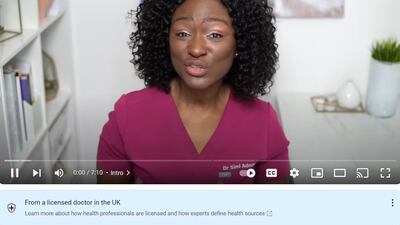YouTube has launched a verification system for content shared by doctors, nurses and other healthcare professionals in the UK, in a bid to tackle medical misinformation online.
The official seal of approval, which will appear as a blue tick, is to be granted to accounts run by licensed health practitioners and organisations that pass verification checks.
Dr Vishaal Virani, YouTube’s head of UK health, said the move was necessary because to the high number of British citizens accessing healthcare information through the video-sharing platform.
Health videos were viewed more than two billion times by people in the UK in 2021, figures showed.
"Whether we like it or not, whether we want it or not, whether the health industry is pushing for it or not, people are accessing health information online," Dr Virani told the BBC.
"We need to do as good a job as possible to bring rigour to the content that they are subsequently consuming when they do start their care journey online."
The verification system began accepting applications in June.
Accounts that applied to the initiative have started to receive a YouTube mark of authenticity on their videos.
Health content creators who submit applications are subjected to a rigorous verification process that works with the UK's Academy of Medical Royal Colleges and the NHS.
Applicants also have their past videos scrutinised and will be denied a verification marker if previous videos contained medical misinformation.
Prof Helen Stokes-Lampard, chairwoman of the Academy of Medical Royal Colleges, praised the initiative with YouTube.
"We all know how difficult it can be to differentiate between healthcare information from trusted and reliable sources and content that is inaccurate or doubtful provenance," she said.
"I am pleased to say we have been able to draw on our own expertise and that of organisations from across the UK healthcare landscape to produce an easy-to-apply set of principles which will ultimately benefit everyone who turns to YouTube seeking trustworthy health information."
YouTuber and doctor Simi Adedeji has already received her YouTube tick.
But Dr Adedeji told the BBC that her videos, which primarily focus on skin and women's health, should not be regarded as an alternative to visiting a doctor.
"There's a difference between giving medical education, which is what we're doing, and giving medical advice, which we don't do," she said.
"It's about giving medical information so that the audience feels empowered and can then go and see their doctor."


